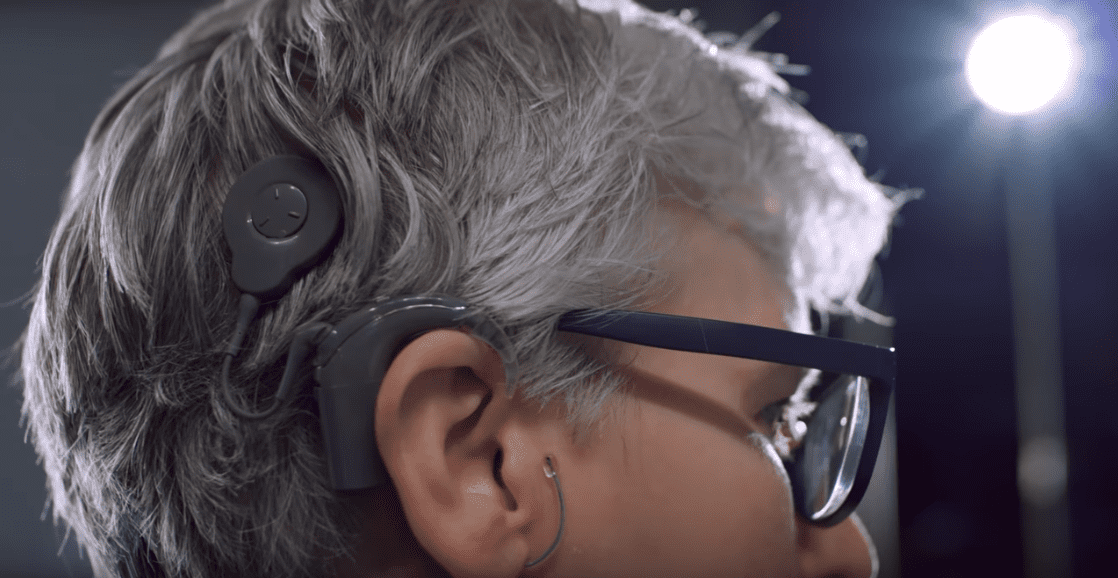Are you or a loved one considering getting cochlear implants? Are you concerned about how you will hear compared to your hearing aids? Learn more about the technology and capabilities of cochlear implants and see how a hearing implant may help you hear better.
Hearing aids vs. cochlear implants
 A cochlear implant is an FDA-approved, surgically implanted medical device that mimics the function of damaged sensory hair cells inside the inner ear, called the cochlea. Cochlear implants can help you get access to the sounds you are missing, and they are designed to help you hear better and improve speech understanding in everyday situations, including noisy environments like restaurants and large family gatherings.
A cochlear implant is an FDA-approved, surgically implanted medical device that mimics the function of damaged sensory hair cells inside the inner ear, called the cochlea. Cochlear implants can help you get access to the sounds you are missing, and they are designed to help you hear better and improve speech understanding in everyday situations, including noisy environments like restaurants and large family gatherings.
Hearing aids are a great first step to treating hearing loss as they work to make sounds louder. However, as hearing loss progresses, sounds need to be made louder and also clearer. Unlike hearing aids, cochlear implants give recipients access to sounds they are missing by providing a clearer sound and can help you hear better and understand speech, even in noisy environments.1
Could a cochlear implant help you hear better?
 There are many different factors that contribute to improved hearing performance. Years of experience and research have shown that hearing implants:
There are many different factors that contribute to improved hearing performance. Years of experience and research have shown that hearing implants:
- Can help you understand speech and enjoy conversations2
- Can provide an improved quality of life3
- Can provide better hearing in noise and speech understanding45
In fact, a recent study by Cochlear found 93 percent of people significantly improved their speech understanding with a cochlear implant compared to a hearing aid, and 83 percent of those individuals reported a statistically significant improvement in quality of life after receiving their implant.6
Sue Y.’s success with her cochlear implant
When Sue Y. learned she was profoundly deaf, she was devastated. The idea of not hearing people’s voices or not hearing music in its completeness—the high pitches, the low pitches and everything in between—was unimaginable. She came to the realization that hearing these things was not going to be possible if she stayed on the path she was on with her hearing aids alone.
Sue was approved for cochlear implants and immediately knew she had to go for it. She wanted to hear the voices of loved ones, the sound of leaves crunching beneath her feet and the bark of her dog.
After getting her cochlear implants, she remembers a fond memory when her friend hugged her and whispered in her ear, “I love you.” This was a sentiment Sue had not heard since she was a child. After this interaction, Sue knew her decision to get cochlear implants had changed her life for the better.
Today, Sue can hear the intricacies of music and the little sounds of life. Cochlear implants have allowed Sue to continue to function in a hearing world and she has not looked back since.
Are you considering transitioning from hearing aids to cochlear implants? Explore why cochlear implants may be the hearing loss solution you have been searching for.
- Who.int. WHO | 10 facts of deafness [Internet: Cited 10 Jun 2019].
- Hirschfelder A, Gräbel S, Olze H. The impact of cochlear implantation on quality of life: The role of audiologic performance and variables. w Head Neck Surg. 2008 Mar;138(3): 357-362.
- Clinical Evaluation of the Cochlear Nucleus CI532 Cochlear Implants in Adults Investigator Meeting. 2019 Apr.
- Hirschfelder A, Gräbel S, Olze H. The impact of cochlear implantation on quality of life: The role of audiologic performance and variables. w Head Neck Surg. 2008 Mar;138(3): 357-362.
- Clinical Evaluation of the Cochlear Nucleus CI532 Cochlear Implants in Adults Investigator Meeting. 2019 Apr.
- Clinical Evaluation of the Cochlear Nucleus CI532 Cochlear Implants in Adults Investigator Meeting. 2019 Apr.